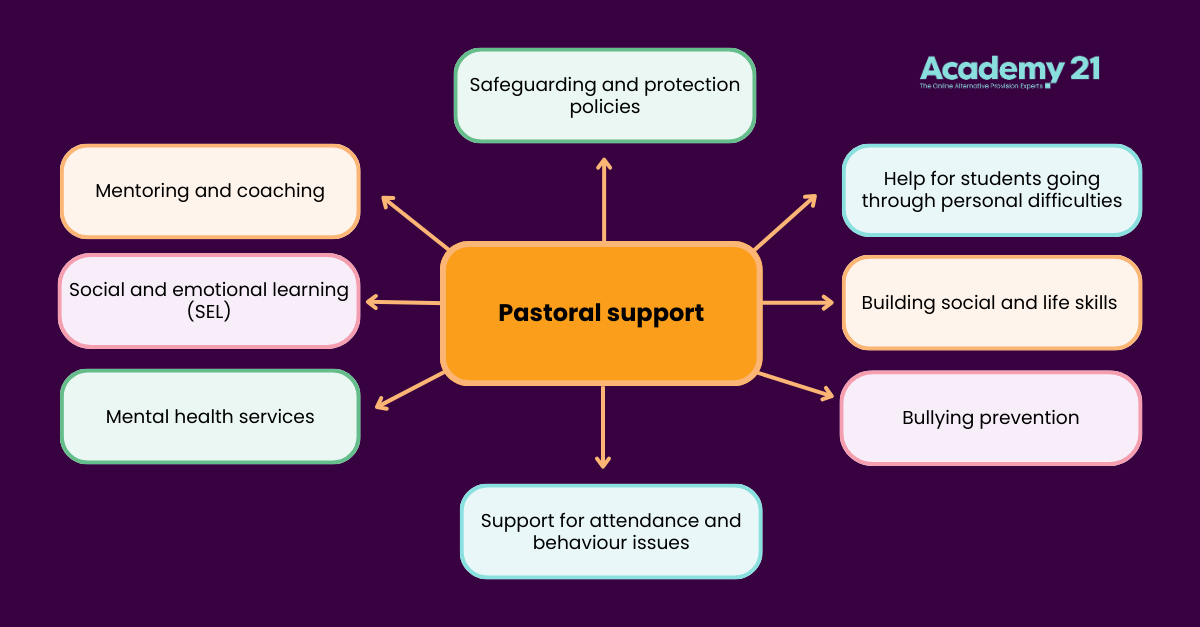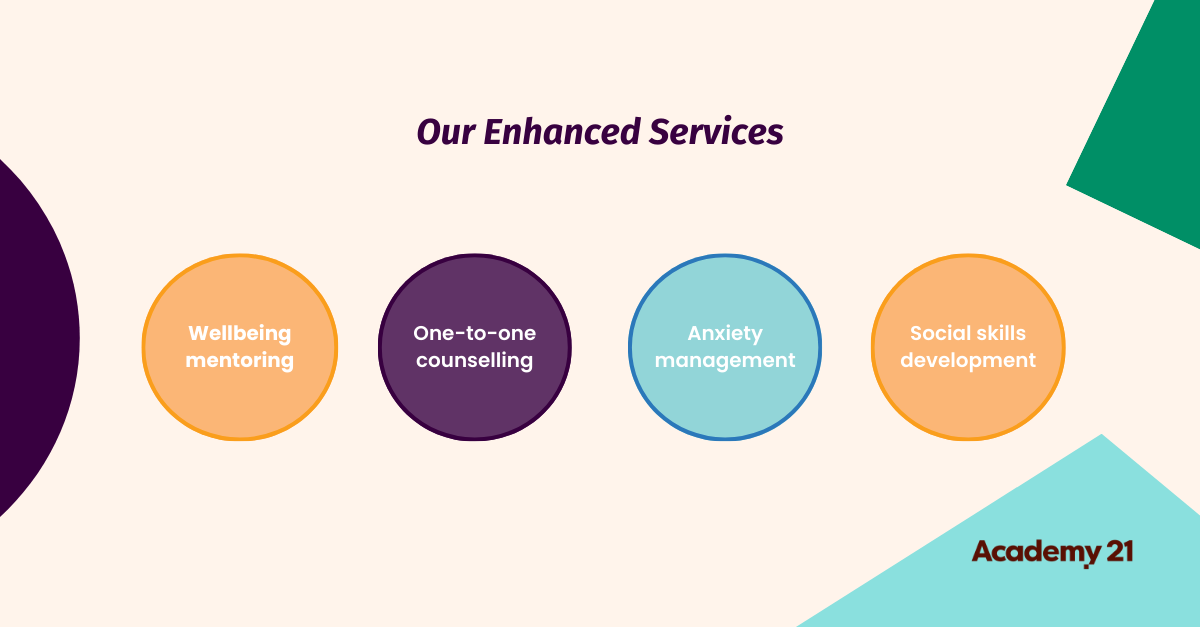What is pastoral support in schools?

Every three minutes, a child in England is referred to mental health services—that’s more than 500 children each day. These figures highlight an urgent reality: students are facing increasing emotional and psychological pressures that go far beyond the classroom. As a result, schools are increasingly readjusting their role, not just as places of learning but as vital support systems for young people. Pastoral support lies at the heart of this shift. More than a set of services, we see a commitment to ensuring every child feels safe, valued, and equipped to face challenges—academically, socially, and emotionally.
What is pastoral support in schools?
Pastoral support refers to the care and guidance that schools put in place to look after students’ social, emotional, and mental wellbeing. Pastoral care ensures that pupils are emotionally healthy, feel safe, and are socially connected. It works alongside an academic focus to support the whole child.
This support can include anything from anti-bullying initiatives and mental health services to mentoring programmes and positive behaviour interventions. In essence, pastoral care builds a bridge between students’ personal challenges and their ability to succeed in school.
Common elements of pastoral support include:
- Mentoring or coaching: Personalised guidance from trusted adults can help students navigate challenges, build self-esteem, and feel more engaged with their education.
- Counselling and mental health services: Trained professionals support students dealing with anxiety, depression, or trauma, offering therapeutic interventions that promote healing and resilience.
- Support for attendance and behaviour issues: Targeted interventions can identify root causes of student absence, working with parents/guardians to help students return to a more stable and positive routine.
- Social and emotional learning (SEL): Programmes focused on empathy, self-awareness, and emotional regulation equip students with lifelong interpersonal skills.
- Safeguarding and protection policies: These policies ensure that students are protected from harm, abuse, or neglect, creating a safe and secure school environment.
- Help for students going through personal difficulties: Tailored emotional support helps students process grief, cope with change, and continue learning despite personal hardships.

Effective pastoral care is proactive as well as reactive. Schools not only respond when problems arise but also work to create a culture of respect, inclusion, and wellbeing that supports every learner from day one.
Why is pastoral care important now?
In 2023–24, NHS referrals for children’s anxiety in England more than doubled compared to pre-pandemic levels, with over 204,000 children aged 17 or under referred due to anxiety—up from 98,953 in 2019–20. This surge equates to nearly 4,000 referrals per week, underscoring a significant mental health crisis among the youth.
The rise in anxiety, depression, and other mental health concerns among children and young people has put pastoral support in the spotlight. Here are a few key reasons why pastoral care matters:
1. It supports mental health
Pastoral services offer a safety net for students who may be struggling silently. Whether it’s through mentoring, emotional check-ins, or group support, these systems can make the difference between a student thriving or becoming overwhelmed.
2. It improves behaviour and attendance
Students who feel cared for and respected are more likely to engage with school. Pastoral care can reduce exclusion rates, improve punctuality, and increase overall attendance.
3. It boosts academic performance
When young people are mentally and emotionally supported, they’re in a better position to focus, learn, and thrive. Pastoral care removes barriers to learning that may otherwise hold them back.
4. It creates a safer, more inclusive environment
Pastoral support encourages diversity, inclusion, and mutual respect. It ensures vulnerable students or those with additional needs don’t fall behind in their education.
5. It helps with life skills
Pastoral programmes often include sessions on resilience, self-regulation, empathy, and communication; skills that serve students far beyond the classroom.
Who delivers pastoral care?
Pastoral care isn’t the responsibility of one person: it’s a whole-school commitment. While some schools have designated pastoral leads or heads of year, every member of staff plays a role in fostering a supportive and compassionate environment.
In some cases, schools bring in external providers or work with alternative provision specialists to extend their pastoral offer. For example, Academy21 offers a wide range of wellbeing and academic services for students outside mainstream settings.
Academy21: Leading pastoral support through Enhanced Services
Academy21 is the UK’s leading online alternative provision specialist. We have years of experience supporting thousands of students with SEN and other challenging circumstances that prevent them from engaging with mainstream learning.
Through our Enhanced Services, we offer a tailored support system that addresses both academic needs and student wellbeing. These services are cost-effective, flexible, and designed to adapt to each student’s unique circumstances.
Wellbeing mentoring
Students can take part in small group sessions (up to three students) or receive one-to-one mentoring from experienced professionals. These sessions are focused on helping students manage stress, build resilience, and re-engage with their learning.
One-to-one counselling
For pupils facing significant emotional challenges, Academy21 provides access to accredited counsellors. These professionals use Cognitive Behavioural Therapy (CBT) and person-centred approaches to deliver in-depth support tailored to each individual.
Anxiety management
Anxiety is one of the most common barriers to school engagement. Academy21 runs targeted small-group sessions that use structured, evidence-based programmes to help students understand and manage anxiety more effectively.
Social skills development
Some learners, especially those with autism or social communication challenges, may need guidance to develop healthy peer relationships. Academy21 offers group sessions that promote understanding of social norms and build confidence in social settings.

How it worked for Mirko
Mirko, a Year 8 student, faced significant challenges with anxiety and social communication, which made school life difficult for him. When he joined our social skills and anxiety management classes as part of our Enhanced Services offering, he began to develop the confidence to engage in class discussions, run errands independently, and even speak in front of peers.
His mother, Emanuela, notes that the courses have equipped Mirko with coping strategies that he now uses daily, even in emotionally challenging situations. As a result, Mirko has not only gained confidence but also tackled challenges he once avoided, such as interacting with others and handling anxiety. “He’s gone from one end to another with his confidence—new identity, new little man, super confident, and very happy too,” Emanuela says.
Effective pastoral support for every student
Pastoral support in schools helps every learner feel seen, valued, and capable. Whether it’s delivered in a traditional school setting or through alternative provision like Academy21, effective pastoral care lays the foundation for academic success and personal growth.
Academy21 offers unique support through live, interactive lessons that are personalised and delivered in small groups, ensuring that students receive the attention they need. With flexible scheduling that works around existing timetables, and a strong focus on inclusion—particularly for students with SEND- Academy21 allows schools to offer a responsive, high-quality solution to students when they need it the most, without compromising existing budget or resources.
Learn more about Academy21’s Enhanced Services.



